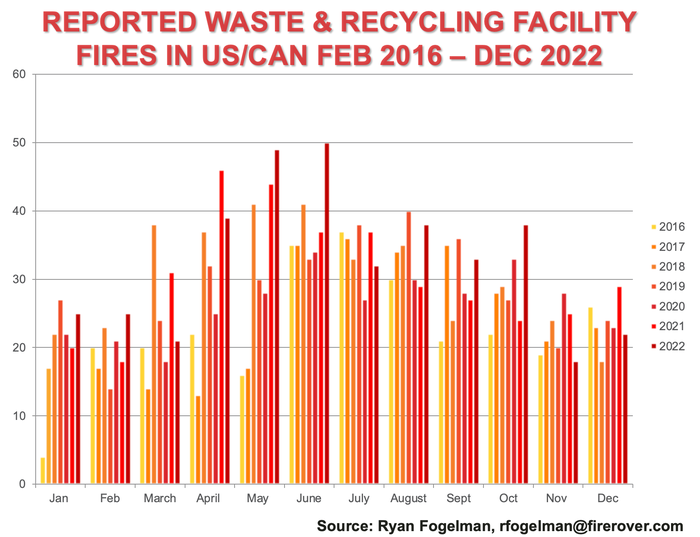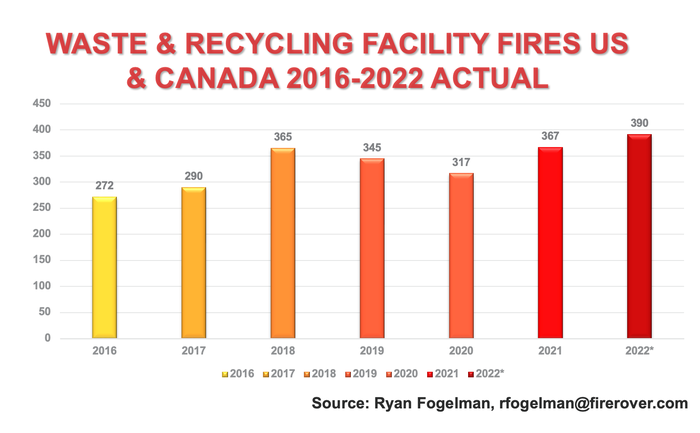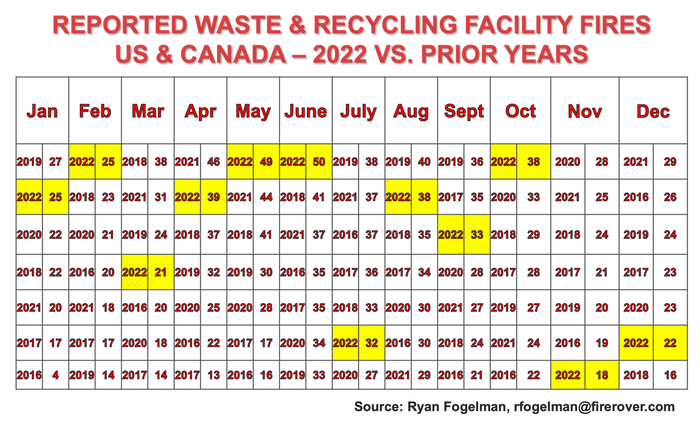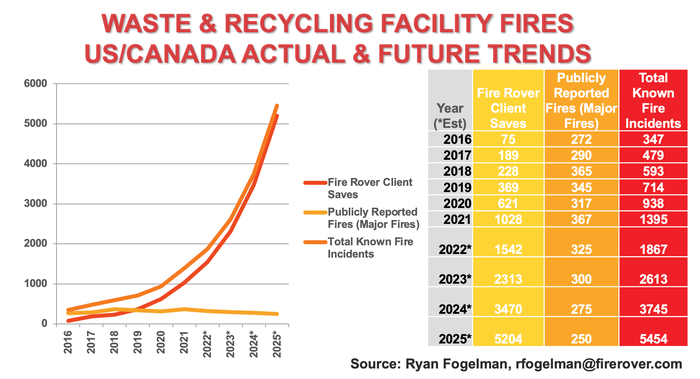Worst Year for Waste and Recycling Facility Fires Ever Capped Off by Best Two Months
The final numbers are in, and 2022 officially surpassed all prior years in regard to waste and recycling facility fires. There were 390 unique fire incidents reported at waste and recycling facilities in the U.S. and Canada, and based on reasonable assumptions, we can extrapolate that 2,400-plus facility fires occurred in 2022.

The final numbers are in, and 2022 officially surpassed all prior years in regard to waste and recycling facility fires. There were 390 unique fire incidents reported at waste and recycling facilities in the U.S. and Canada, and based on reasonable assumptions, we can extrapolate that 2,400-plus facility fires occurred in 2022.
December 2022 Fire Data
In December, we experienced 22 publicly reported fire incidents in the U.S. and Canada. Thirteen fire incidents occurred at waste, paper and plastic facilities; five occurred at scrap metal facilities; and two occurred at a construction and demolition (C&D) facility, a hazmat operation and a rubber facility. Although the numbers were down for reported fires across the industry, at Fire Rover, we responded to more than 100 fire incidents at our clients’ facilities, keeping pace with the more than 100+ average we experienced during the year.

It's Official
2022 officially surpassed 2021 and 2018 as the worst year for waste and recycling facility fires in the U.S. and Canada since I began reporting the data in 2016. I want to make it 100% clear that the data I have been consolidating and analyzing since 2016 only includes the fire incidents that were “reported” by a media outlet or a government agency publicly.

2022 is one for the books. The good news for the year is it could have been much worse. In the beginning of the year, we were forecasting to an unseen pace, and we hit records during the first three months. In fact, we hit records, or almost records, in seven of the first ten months of the year.

After 2018, we saw a decrease in fires in both 2019 and 2020. At that time, I made an assumption, which is highlighted in the graph below that was shared in last year’s annual report.

Even as lithium-ion battery contamination increases the fire risk in the industry, we would have fewer reported fires in the media. Why? My reason is simple: The more Fire Rover systems we install at facilities across the U.S. and Canada, the more fires we would know about, even if they’re less severe. The “severity of the fire” is the driving factor in whether the fire garners the attention to make the news.
In reality, we experienced 390 fires in 2022, which is substantially higher than the 325 figure that I had initially forecasted. We can only hope that the investments the industry has made in technology, education and operational best practices start to stem this tide of increasing fires we have experienced over the past two years. The hope is that my forecast is not incorrect just before its time. Only the future will tell.
As I begin to work on the 6th annual edition of the "Waste & Recycling Facility Fires Annual Report," I look forward to breaking down the hazards of the different incidents by material, state, tonnage and more with the ultimate goal of finding new trends or learnings from these incidents. At the very least, we will have a more accurate prediction of what’s to come in our future. To be first in line to get a copy, subscribe to my newsletter: “Fire Safety Report.”
Conclusion
Now that 2022 has come to an end, I would like to share a few stories from the year that I feel are valuable to read, or reread. I have provided the titles below along with a couple of sentences on why I feel the topic is worth your attention.
Environmentally Responsible Firefighting is a Reality Fire water is a huge issue that needs to be addressed due to several factors, PFAS being the most pressing.
Are EV Batteries Creeping into the Waste & Recycling Streams? The lithium battery issue we currently face in waste and recycling facilities is mostly from personal electronics or personal storage, but we are starting to see electric vehicle (EV) batteries invade the waste and recycling streams with some very unpleasant consequences.
Is Climate Change Responsible for Our Worst Fire Month on Record? I don’t care where you fall in the issue of climate change, but one fact is temperatures have an effect on the number of fire incidents that have occurred in our waste and recycling streams.
Can TikTok Help the Industry Reduce Fires Through Education? How do we teach the public how to recycle responsibly? Educate kids and young adults on channels that reach and can affect their behaviors.
I hope you are having a great start to 2023!
Ryan Fogelman, JD/MBA, is vice president of strategic partnerships for Fire Rover. He is focused on bringing innovative safety solutions to market, and two of his solutions have won the distinguished Edison Innovation Award for Industrial Safety and Consumer Products. He has been compiling and publishing the “Reported Waste & Recycling Facility Fires In The US/CAN” since February 2016 and the “Waste & Recycling Facility Fires Annual Report.” Fogelman regularly speaks on the topic of the scope of fire problems facing the waste and recycling industries, detection solutions, proper fire planning and early-stage fire risk mitigation. Additionally, Fogelman is on the National Fire Protection Association’s Technical Committee for Hazard Materials. (Connect with Ryan on LinkedIn at https://www.linkedin.com/in/ryanjayfogelman or email at [email protected])
About the Author
You May Also Like




